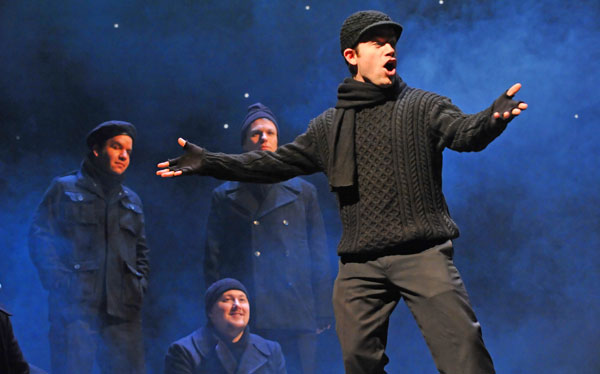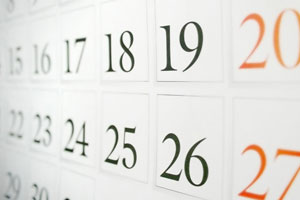Music director Erick Lichte promises dynamic reincarnation of ‘All is Calm’

“All is Calm – The Christmas Truce of 1914” comes to the Fox Cities Performing Arts Center in Appleton on Dec. 9. Photo courtesy of the Fox Cities Performing Arts Center
On Dec. 9, a brand-new production of “All is Calm – The Christmas Truce of 1914” comes to the Fox Cities Performing Arts Center in Appleton. I had a chance to talk to music director Erick Lichte about the production and his role in bringing to life this remarkable true story of Christmas on the front lines during World War I.
Q: So, can you tell me a little about yourself?
A: Well, I was born in Appleton, I sang in the Appleton Boychoir and I graduated from Appleton East. At St. Olaf College in Minnesota I started a professional singing group called, Cantus, of which I was a member and the artistic director. Now, I work with a 60-voice men’s chorus in Vancouver and I’ve been the conductor there for three years.
Q: How did you get involved in the production?
A: Peter Rothstein, the director and playwright of “All is Calm,” approached me and wanted to see if I would be interested in being part of the play. I knew a little bit about the show, but I immediately saw the potential of the show. Peter has a strong reputation and I wanted to be a part of that.
Q: How did you go about composing the music for this show?
A: We built off of this ring of authenticity. These men really did sing. Peter and I were orchestrating it alongside the text. Some pieces come across as more natural, but other pieces are far more composed. In any kind of musical theater, it’s a little unbelievable, but this really happened. Of course, some of these arrangements are obviously more complex than what they might have sung, and that’s where I came in. I knew the musical moments we needed to create. Like with “Silent Night,” we needed to portray the song that everyone knows, but also convey the moment in the play. It was fun to have a collaborator like Peter and who really focused the direction and wanted to make specific things happen. Sometimes, having fewer choices as an arranger/composer is better because it focuses your work.
Q: Tell me more about the historical aspect. How much did you take from history?
A: Peter did massive amounts of research for the show. He and I sat down and talked about the structure and form of each piece. We decided that it would be told through the words of the men that lived this, so it’s all told with World War I poetry, diary entries, grave inscriptions, historical documents and official military documents. It’s many, many voices, not just the story of one soldier. And, we actually do the citation in the performance — the actor will say the line and then cite that specific person. In fact, we also hear from some of the upper ranks and how they forbade these truces. So, we are really telling this story in the most truthful of all ways. It seems like a fantastical story, but it’s so potent because they really are the words of the men who lived this. We take this as an enormous responsibility because we are writing the words of these heroes who decided to make peace for one night. Once we weaved all the stories together, I started composing for the work. We sort of knew that we were making something really wonderful, we just didn’t know that it would make such a big impact for the last eight years.
Q: Do you think music is at the heart of this show?
A: Indeed. The truce would not have happened without music. And, there is singing throughout almost the entirety of the piece. There are only a few moments where there isn’t singing. We live in a culture right now where men singing seems so foreign to us, but that was not the case back then. The trenches were so close to each other that they could hear each other, and by the time they hit Christmas, trench life was miserable. The German and Allied forces had much more in common with each other living in the trenches than with their superiors. So, this shared misery along with music was the common denominator. The German officer who famously started singing “Silent Night” started the whole thing. And, it happened for miles and miles up and down the line, so there were multiple truces all down the line. It doesn’t seem real, but we have the evidence. It happened.
Q: Is there a particular song or piece that stands out to you in the show?
A: The “Silent Night” sequence when the first German soldier stands up with his arms out singing. I think that song has some sort of emotional impact in our lives, and taking this peaceful lullaby song as a flag of truce … it seems like the most audacious aspect. That you would use that song in a way to get someone to not shoot at you. … And, then we hear three voices doing the second verse in three different keys at the same time … and there’s this sense of not quite harmony just yet, and the song develops until we find the harmony in the end.
Q: What can you tell us about the production coming to Appleton?
A: This year, we are creating a brand-new production with 12 actor/singers. What Appleton will be seeing is an entirely new reincarnation of the show. It’s going to be very exciting to have a far more dynamic piece. I’m really excited to see the show I know so well get this makeover and how that’s going to affect the story. When I found out it was coming to my hometown, I was so proud, and I think this show has restored my faith in that message and the power of this holiday time. I think it’s entertaining, thought-provoking, and really gets to the heart, and it’s completely impacted my view of the season.











Leave a Comment